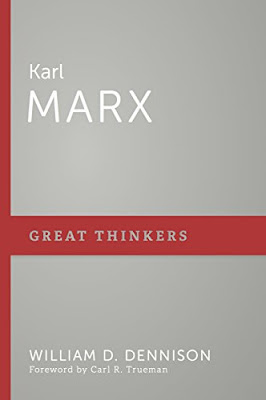Book in Review: Karl Marx (Great Thinkers)
 I am a Marx novice, but wanted to get a proper introduction
to a thinker whose work has left such an indelible and bloody mark on history.
Marxist thought is also making a sweeping comeback in college campuses and in
the new Left movement (particularly among the young)--class warfare, class
oppression, elevation of the socio political to the primary, lumping the
individual into the collective--all ring familiarly of Marx. For this reason I
wanted to read an analysis of Marx from a Christian perspective to see where
he, as well as the new movements, fall short.
I am a Marx novice, but wanted to get a proper introduction
to a thinker whose work has left such an indelible and bloody mark on history.
Marxist thought is also making a sweeping comeback in college campuses and in
the new Left movement (particularly among the young)--class warfare, class
oppression, elevation of the socio political to the primary, lumping the
individual into the collective--all ring familiarly of Marx. For this reason I
wanted to read an analysis of Marx from a Christian perspective to see where
he, as well as the new movements, fall short.
Dennison gives a brief and academic analysis of the life and
works of Karl Marx. He then charts Marx's view of history and followed by (my
favorite part) a Christian Presuppositional Analysis of Marx's view of History.
Interestingly enough we see that not all (key word all) of Marxist thought is evil. Marx observed vast injustice in his day through the division of
labor--where the rich minority were only getting richer--and the unwashed masses
were being used and exploited only to remain poor. He saw the introduction of
the factory and the machine only further oppress the proletariat, as work hours
were being extended and women and children were employed to likewise fuel the
fires of industry. In light of this, Marx thinks of a "better way".
He dares to imagine a world of true equality. A world where there is no private
property, no financial classes, no division in population, and none of the
historical slavery of a worker to his work.
In his critique, Dennison shows how Marx's desire for
"heaven on earth" while rejecting all religion/supernatural
desperately misses the mark. It was C. S. Lewis who said: "If you read
history you will find that the Christians who did most for the present world were
just those who thought most of the next...It is since Christians have largely
ceased to think of the other world that they have become so ineffective in
this. Aim at Heaven and you will get earth 'thrown in': aim at earth and you
will get neither." Marx's communist utopia was undoubtedly aiming at
earth, and for many nations around the world in the 20th century it quite
literally created hell on earth. The opposite of his intensions.
What I think Marx's greatest mistake, however, was his deep
misunderstanding of human nature. Dennison touches on this near the end of his
critique--but it is more of a cursory point. Marx actually thought that if the
economic issues could be fixed, if society could be corrected, if all
inequalities could be leveled--then Utopia would be achieved. This is a fatal
blunder in Marx's thinking, perhaps the most fatal, for if there is one thing
history confirms it is the brutally wicked nature of the human heart. At its
core, it is humanity, not society that is deeply flawed. It is we who are
greedy, vengeful, violent--not just our external conditions. If all inequality
could be solved (by some miracle), humanity would immediately ensure that it
doesn't last for a moment--and society would spiral into new inequalities and
injustices, only in the reverse of what they were before.
All in all, Dennison's book is a good introduction to one of
the most influential thinkers of all time. My criticism is that his prose is a
little unnecessarily scholastic and lacks a natural, comfortable flow. There
were also a few things I wish he would have touched on more significantly (a
brief Biblical view of private property, further explanation of the depravity
of mankind), but all in all, this short book definitely sparked my interest of
getting into Marx a little deeper.


Comments
Post a Comment